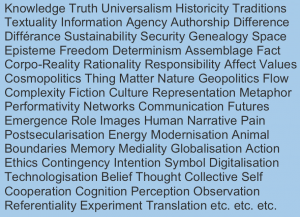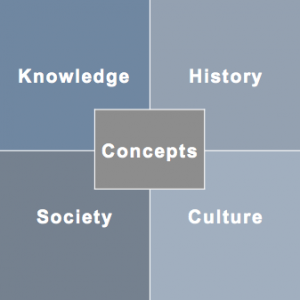Dear participants of the Winter School 2012
The memory of our lively conversations is as fresh as the snow that (finally) covers the Swiss landscape now. I would like to thank you once more for your manifold contributions to the success and friendly atmosphere of the first of a series of at least four of such international events for doctoral and postdoctoral students. It was marked by intellectual curiosity, polite dialogue and mutual learning as well as cheerful evenings of music and play.
In the following, I would like to post the overall concept of the Bernese Winter School that I introduced in my welcome speech on Sunday evening. Many of its components are modelled on the interdisciplinary Graduate School at the Institute of Advanced Study in the Humanities and the Social Sciences GS@IASH where I act as programme coordinator. The doctoral programme of this Graduate School focuses on key concepts of the humanities, cultural studies and the social sciences at the intersections of four dimensions:
Each semester we select four concepts. This Spring semester, for example, these are:
geopolitics – observation – alterity – ritual
Public lectures by invited guest professors from outside the University of Bern address the geneaology of these concepts as ‘mini-theories’, its most important ‘shapers’ in various fields, the specific problems raised by it and the most innovative approaches to tackle these questions. The talk is followed by a day-long colloquium with the guest and a Bernese professor in which our doctoral students present their PhD project in relation to the chosen concept and theoretical essays.
I decided to use this model for the Winter School also, insofar as each of the four fields figures more prominently in one of the next four years:
But I’ve also tried to make sure that all four dimensions are present to different degrees in each winter school. The way to assure that, as it is also the case with the Graduate School, is by means of “travelling concepts”, concepts that are mobile, transversing many disciplines and also everyday discourses, practices and contexts in different spacetimes.
As most of you probably know, ‘travelling concepts’ is a methodology proposed by Dutch narratologist and cultural analyst Mieke Bal who with her book of 2002, Travelling Concepts in the Humanities: A Rough Guide, invites scholars of the humanities „to seek their theoretical and methodological basis in concepts rather than methods“ (see Reader).
Working with concepts is hence not a method in a narrow sense but a heuristic tool and analytical practice for communicating across disciplinary boundaries – a translation tool we could also say.
Bal herself draws on an interdisciplinary collection of essays, D’une science à l’autre. Des concepts nomades – a book that was co-written by scientists and scholars led by Belgian philosopher of science Isabelle Stengers (whose ‘cosmopolitics’ we discussed in the parallel session “The Human and Its Others”). In the Introduction, Stengers defines the purpose of concepts that travel between the sciences as opening up debates and facilitating invention. ’Travelling concepts’ or ‘nomadic concepts’ (to use her term) have the power of ’propagation’ by which Stengers means the potential to organize phenomena in new and relevant ways (see Reader):
La formulation d’un concept scientifique signale en effet une opération à faces multiples: opération de redéfinition des catégories et des significations, opération sur le champ phénoménal, opération sur le champ social. Un tel concept a en effet pour vocation d’organiser un ensemble de phénomènes, de définir les questions pertinentes à son sujet et le sens des observations qui peuvent y être effectuées.
It is in the reorganization of the field it facilitates that a concept generates the production of meaning. In other words, concepts enable not only a description or representation of phenomena but experimentation with phenomena.
Stenger’s emphasis on experimentation and invention shows the influence of Gilles Deleuze who, in his turn, shows affinities to thinkers like Søren Kierkegaard, Friedrich Nietzsche and Henri Bergson who sought to, as Deleuze writes, „put metaphysics in motion“ (Difference and Repetition).
Such an attitude is diametrically opposed to a dogmatic understanding of cognitive proceseses as fundamentally passive relations to a world already out there that simply needs to be re-cognized, re-presented – in language – by the cogito as reality, fact or truth. Deleuze’s approach by contrast is anti-representational; i.e., representation is abandoned in favour of invention and intervention. It is a mapping rather, which is closer to performance and oriented towards experimenting with the real, acting upon and thereby trans/forming it. Concepts are unfolding, constructing meanings on the run, as it were.
Concepts, precisely when or because they travel across disciplinary boundaries, do not have behave the same in every territory and also not for everyone in the same ‘country’. As a result, concepts are conducive to a collective groping not so much for what a concept means but for what it does in a specific field or in relation to an artwork, a literary text or a material object, etc. Leading to encounter, exchange and debate in the contact zone of various disciplines and standpoints, concepts thus foster an awareness of difference and différance.
The Winter School 2012-2015 should precisely foster such encounters – and I think the first one did quite well in this respect thanks to your openness towards ‘signifying others’ and a critical reflection on the limits of one’s knowledge. (Please comment on the potential/strength and limits/weaknesses of this approach; why it did/did not work for you.) The larger aim we have with this concept-based methodology is to collectively build an ensemble of mobile and ‘relastic’ (see Bettina Bruder’s project, WS 2012) to analyse trans/formation processes in the past, present and future(s).
With “TransForming Knowledge and Epistemic Cultures”, the focus of the Winter School 2012 was perhaps more philosophical-theoretical and concerned with current vectors in science studies, especially those that have taken a turn from constructionism towards constructivism, producing what Barbara Herrnstein Smith calls „scandalous knowledge“ (see Reader). Such fields include actor-network theory, human-animal studies, critical posthumanism, political ecology, environmental humanities, medical humanities, digital humanities.
In accordance with the concept of interlinking the four dimensions throughout the duration of the Winter School project, we have also invited professors who add a historical perspective and concrete cases (see lecture Roland Wenzlhuemer but also Michael Hagner and Stefan Willer). Moreover, individual sessions were dedicated to the symbolic formation of knowledge in sessions on the use and role of metaphors and translation as trans/formation. And, last but not least, the socio-political processes of transformation in local as well as global contexts were discussed in relation to concepts like “network society”, “geopolitics”, “cosmopolitics” or “intercultural encounters”.
Other concepts that figured prominently in the Winter School 2012 were:

They will again be present in one way or another in 2013, when we put “anachronisms”, “dis/continuities”, and “r/evolutions” at the centre of the programme. These concepts and the future programme are as flexible and open as the MANIFLEXO (thanks, Roland) that will appear on these pages soon. Stay tuned!
Meanwhile, I send you my best wishes,
Manuela



